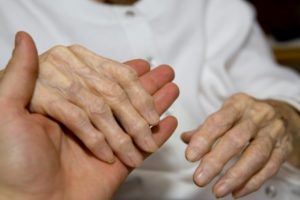 Depression has been found to worsen pain experienced in rheumatoid arthritis. Rates of depression among rheumatoid arthritis patients is estimated between 13 to 42 percent which reveals how closely associated the two conditions really are. As to why depression is so prevalent in arthritis is that dealing with a chronic condition is stressful which can take a toll on someone’s mental health.
Depression has been found to worsen pain experienced in rheumatoid arthritis. Rates of depression among rheumatoid arthritis patients is estimated between 13 to 42 percent which reveals how closely associated the two conditions really are. As to why depression is so prevalent in arthritis is that dealing with a chronic condition is stressful which can take a toll on someone’s mental health.
Depression can stem from the acknowledgement that a person with arthritis is unable to perform common functions which they did before or form living in pain. Furthermore patients may feel anxious that they now need to rely on others for support along with worrying about changes that are occurring with their bodies.
How depression worsens arthritis pain
Advertisement
A study looked at how depression can worsen pain in arthritis. The researchers looked at 56 patients with rheumatoid arthritis who completed questionnaires to assess depression and anxiety levels. The researchers followed up with the participants after a year and found a strong association between how patients felt emotionally and the amount of pain they experienced. Essentially, the lower the mood the more pain they felt.
The researchers suggested that depression and anxiety worsened pain sensation but also depression can contribute to how closely patients adhere to taking their medications and partaking in other healthy behaviors.
Overall, the researchers concluded that living with rheumatoid arthritis increases the risk of depression and that depression is treatable so by targeting depression in rheumatoid arthritis patients can begin to feel better and improve treatment.
Related: Is rheumatoid arthritis considered a disability?
Role of inflammation in both diseases
Inflammation is present in both depression and rheumatoid arthritis. Patti Katz studies chronic disease in adults and she explained, “There is evidence that depression is an inflammatory disease, and there is also evidence that people with high levels of certain inflammatory biomarkers in their system are more likely to develop depression. Some of those markers are the same ones that are elevated in rheumatoid arthritis.”
“There’s been less concern about the actual inflammatory component of depression in rheumatoid arthritis simply because there’s more focus on reducing symptoms, like pain, that have a more obvious relationship with depression. But if inflammation is, indeed, a component of the depression some patients feel, treating the inflammatory process probably helps,” Katz concluded.
How to Manage Depression Due to Arthritis?
Here are some tips to help you better manage depression due to rheumatoid arthritis.
Get treatment: It’s important that you seek treatment for your RA. Leaving Ra untreated can worsen symptoms of depression.
Get rest: RA and depression can cause restless sleep, and lack of sleep can worsen symptoms of RA and depression. Here are some tips to consider to improve sleep and get rest: Go to sleep and wake up at the same time daily, sleep in a cool and dark room, avoid eating and drinking alcohol and other stimulants too close before bedtime, avoid screen time prior to bed, take a warm bath or shower, use relaxation techniques to reduce stress, and evoke calmness.
Eat right: There are many foods you can consume which can help reduce inflammation along with improving mood. Avoid processed foods, fats, and sugars to stay healthy and to reduce inflammation.
Get outside: Heading outdoors provides you with fresh air and a change of scenery. If you are stuck indoors or the same place it can intensify your depression. Although you may want to stay in due to your symptoms, it’s important you try to make an effort to change your scenery.
Exercise regularly: You may think exercising is too difficult with RA but it is encouraged as it can lessen symptoms. Furthermore, when you exercise endorphins are released which boost your mood.
Talk to people: Let your friends and family know how you feel so they can have a better understanding of your feelings along with abilities. They may be able to offer your help.
Advertisement
Seek therapy: Speaking to a counselor or therapist can help you develop coping mechanisms for your depression.
Talk to your doctor: If you are having difficulties managing your RA and depression than speak to a doctor about other options available.
Also read:
- Rheumatoid arthritis remedies: Diet and exercise
- Benefits of using essential oils for rheumatoid arthritis pain relief
